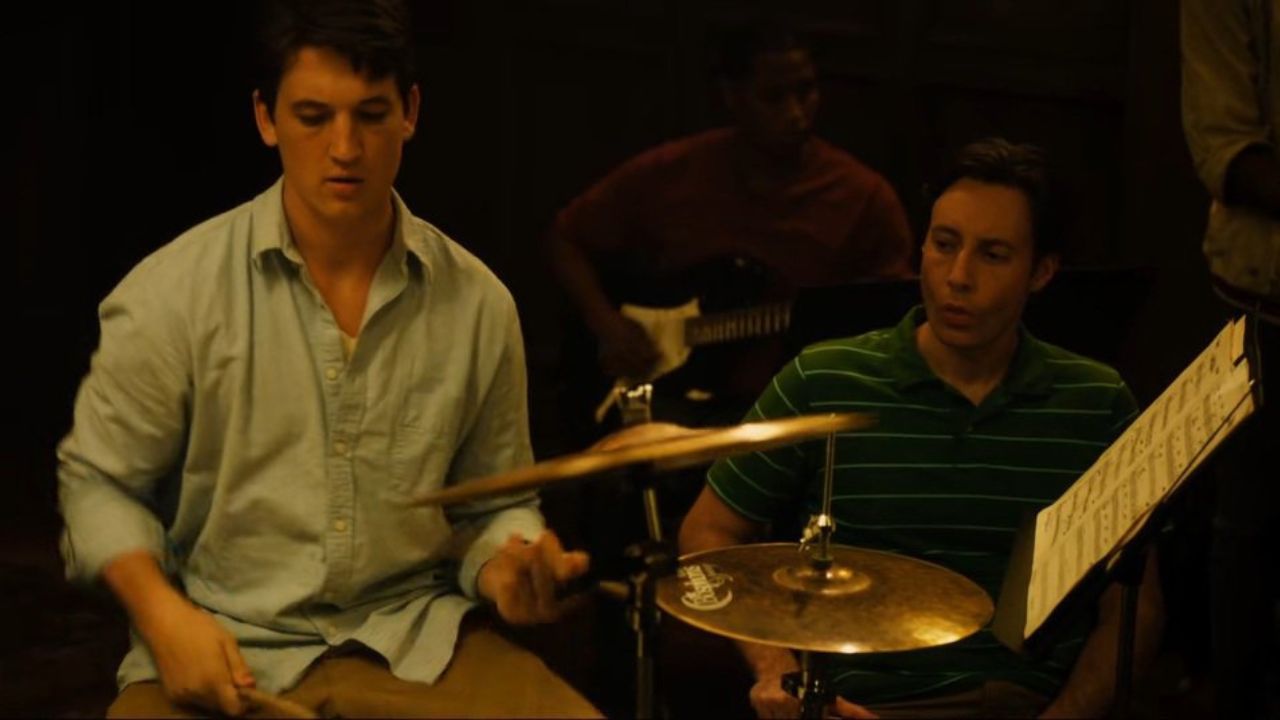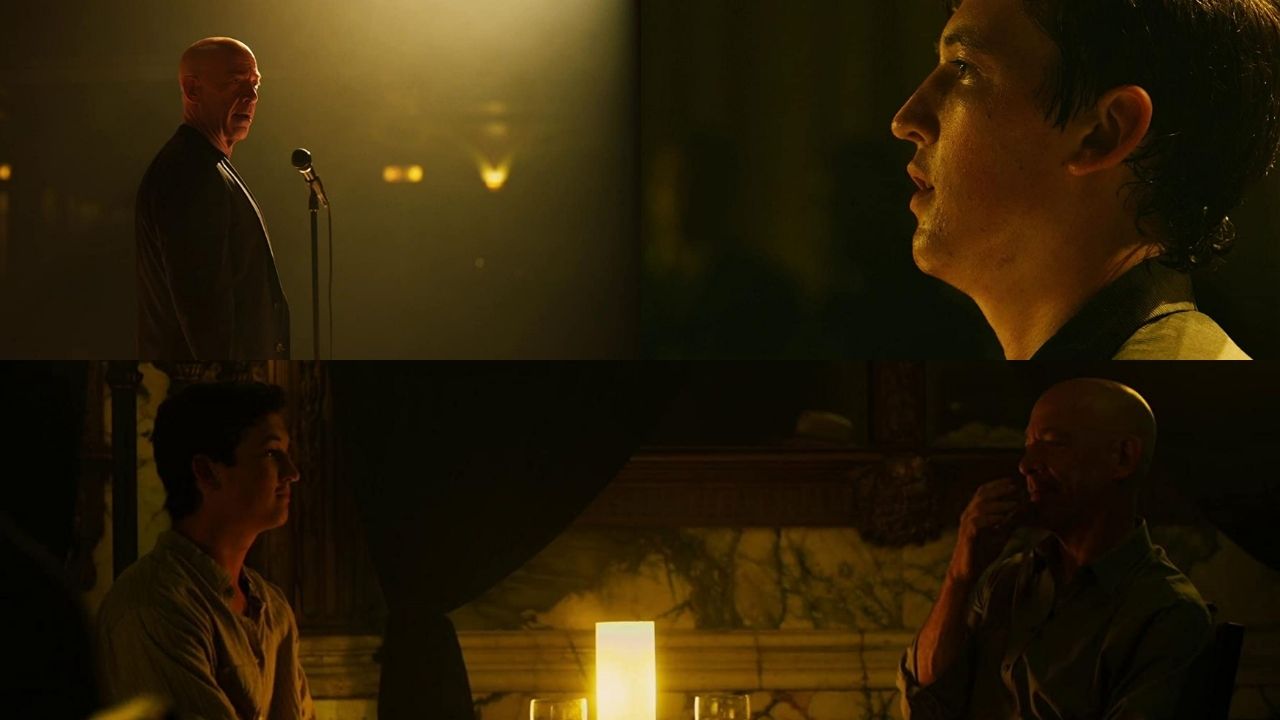This post includes a brief plot summary and an explanation about the ending of the film Whiplash (2014). Beware of spoilers.
Directed by Damien Chazelle, the 2014 drama stars Miles Teller as Andrew Neiman and J. K. Simmons as Terence Fletcher.

The film “Whiplash” is about a young jazz drummer, Andrew Neiman, who wants to become one of the greats. Andrew successfully enrolls in a prestigious music school, Shaffer Conservatory. Then, the young man joins the class band led by Terence Fletcher, a ruthless instructor who pushes his students to the limit.
What Happens in “Whiplash”? (Plot Explained)
Andrew struggles to meet Fletcher’s high standards and cope with his harsh criticism. During his time in Shaffer, Andrew practices obsessively, sacrifices his personal life, and even injures himself in the process. He even develops a rivalry with another fellow drummer, Ryan, who competes with him for the core spot in the band.
Since meeting Fletcher, Andrew has had very little time for his personal life. The young man’s ambition and obsession with perfection eventually led him to break up with his girlfriend, Nicole. Not only that, but Andrew takes out his frustrations on his family and clashes with Fletcher.
On his way to a competition, Andrew suffers a car accident. Despite the injuries, Andrew insists on playing. He performs poorly and Fletcher fires him from the band. Meanwhile, the parents of Sean Casey, one of Fletcher’s former students, are suing the instructor for their son’s death. They now want to persuade Andrew to anonymously testify against Fletcher.
Andrew agrees to anonymously testify against Fletcher and the school fires the instructor. After that, the young man tries to move on with his life. Andrew reaches out to Nicole, but she has a new boyfriend. Months later, Andrew stumbles upon Fletcher again, who is playing at a local jazz club.
The former instructor explains the reasons behind his harsh teaching methods, which makes Andrew have a change of heart. Fletcher invites him to play at a prestigious concert, claiming that it will be the same songs that Andrew played at school. The young man gives it a shot and accepts the invitation.
At the concert, Andrew realizes that Fletcher has set him up to fail by giving him a song he doesn’t know. The young man tries to play along, but Fletcher sabotages him and humiliates him in front of the audience. Andrew walks off the stage but then returns and starts playing another song that he knows well: “Caravan”.
The Ending of “Whiplash” Explained
The ending of “Whiplash” shows Andrew challenging Fletcher to follow him and leads the band in an impressive solo. Fletcher initially tries to stop Andrew, but then joins in and guides the young man through the performance. As they reach the climax of the song, Fletcher nods at Andrew, acknowledging him.
What is the significance of the final drum solo?
The final drum solo in Whiplash is rather open to interpretation. It all depends on whether the viewer sees the ending positively or negatively.
From a more positive point of view, one could say the ending scene represents Andrew’s triumph over his abusive instructor, Fletcher. In this reading, the final drum solo could be seen as a moment of self-discovery and empowerment for Andrew, who has learned to stand up for himself.
Nonetheless, in a more negative light, “Whiplash” doesn’t necessarily have a “happy ending”. Some view the final drum solo and the ending as a cautionary tale about the dangers of obsession masked as a relentless pursuit of greatness. In this reading, Andrew is still under Fletcher’s control because he is still seeking his approval.
What is the message of “Whiplash”?
The film “Whiplash” tries to convey the message that the pursuit of greatness can come at a great cost. In the process of becoming an exceptional drummer, Andrew had to sacrifice some of his humanity and even his sanity. According to Fletcher, he also had to stop caring about what others thought of him in order to push his students further.

“Whiplash” suggests that traditional methods of teaching and mentoring may not always be the most effective. Sometimes, unconventional methods may be necessary to bring out the best in someone. Ultimately, it’s up to the audience to decide whether the end justifies the means.
Whiplash Analysis and Themes
The film “Whiplash” explores the themes of ambition, the pursuit of greatness, obsession and pain. Andrew Neiman is a young jazz drummer in “Whiplash” and his journey at Shaffer Conservatory serves as a warning that success might come with a hefty cost.
In “Whiplash”, the themes of ambition and the pursuit of greatness are intimately related to each other. Ambition is what is behind Andrew’s desire to achieve higher heights regarding his career goals. In the pursuit of greatness, Andrew practices relentlessly and sacrifices his personal life. Meanwhile, he also had to endure harsh criticism and abuse from his teacher, Fletcher.
Although Fletcher pushed Andrew to his limits, the latter also believed that greatness requires great hard work and suffering. At the time, the young man believed that only by going through those types of hardships could he prove himself worthy of being one of the best.
Andrew Neiman’s obsession with becoming a great drummer causes him to experience physical and emotional pain. First, he injures his hands from drumming too hard and bleeds on his drum kit. Then Andrew gets into a car accident on his way to a performance.
During his time at Shaffer Conservatory, the young man suffers from anxiety, stress, and isolation as he alienates his family, friends, and girlfriend. This causes Andrew to become paranoid and competitive with his fellow classmates. Later on, he even loses his sense of joy and passion for music.
“Whiplash” shows that ambition and the pursuit of greatness can have a dark side. In addition, it also emphasizes how pain and obsession can be destructive forces that consume a person’s life. The film also raises a heavy debate about the role of mentors in shaping an artist’s career and identity. And it is up to the viewer to think about what it means to be great and what price one is willing to pay for it.

Final Thoughts
Whiplash is a very intriguing film because it challenges your personal biases. Fletcher was, without a doubt, the most fascinating character in the film because of his ambiguous nature. The viewer never really knows whether Fletcher is really trying to help Andrew or if he is just playing with his feelings. Although things become clearer when Fletcher tries to sabotage Andrew, it gets confusing again towards the end.
The ending of Whiplash was rather abrupt, which makes it very open for interpretation. However, one way or another, viewers will draw their own conclusions about who Fletcher really is. Some might view the man as a sadist who likes to take advantage of his position to taunt his students. While others might see a method behind Fletcher’s harsh teaching style.
Some might say that Whiplash glamorizes the idea of a tortured artist. I partially agree with that statement. Although Andrew has been through a lot, at the end of the day, the young man made a choice. Fletcher might be abusive and controlling, but Andrew could’ve walked away from his class at any given moment. Having said that, I believe Whiplash is also a great reminder that life is made of choices.
Overall, Whiplash is one of those films that stays with you. In addition, the viewer will feel differently about Whiplash every time they rewatch it. Why is that? Things in Whiplash are not black and white. Some days, the viewer might even sympathize with Fletcher’s point of view. It really depends on the person’s current state of mind. Therefore, whoever has watched Whiplash before should try to do it again and see how they feel about it.


